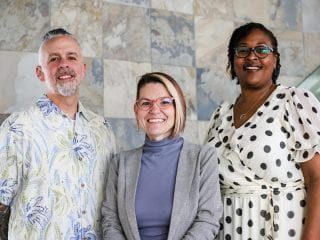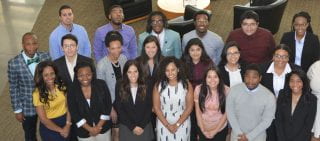U of A Receives $300,000 to Evaluate Efficacy of Summer Pre-Law Program

U of A’s Shaun Thomas, left, Johanna Thomas, and Greneda Johnson, recipients of a $300,000 grant from AccessLex Institute to evaluate and expand the U of A School of Law’s Summer Pre-Law Program Arkansas, known as SPPARK. Photo by Austin Brown.
An interdisciplinary research team from the University of Arkansas was recently awarded $300,000 from AccessLex Institute to extend the university’s ongoing efforts to support underrepresented and marginalized students seeking to prepare for law school.
The team includes researchers and faculty from the U of A’s School of Law, as well as from its Fulbright College of Arts and Sciences’ Department of Sociology and Criminology and School of Social Work. The funding will support the expansion and a rigorous evaluation of the School of Law’s Summer Pre-Law Program Arkansas, known as SPPARK.
“SPPARK is an intervention program that addresses challenges in the educational pipeline to the legal profession by exposing historically underrepresented students to information, skills, resources and mentors focused on facilitating successful matriculation into law school and the legal profession,” said research team member Johanna Thomas, who is an associate professor and director of the School of Social Work.
“The evaluation team will conduct a quasi-experimental process and outcome evaluation of SPPARK in the effort to showcase the impact of the program,” she added.
Cynthia Nance, dean of the University of Arkansas School of Law, said that the school has “a rich history of valuing and creating access to the legal profession.”
“We are grateful to have been selected as one of the recipients of AccessLex Institute’s Diversity Pathway Intervention Grant Program. This generous grant will allow us to expand the summer pre-law program and offer it to more students who are interested in studying law, while tailoring the program offerings to the needs of the participants,” Nance said.
Over the past decade, the mission of the SPPARK program has not wavered as it strives to ensure students from diverse and underrepresented backgrounds are being recruited to law school and the law profession.

A group of previous participants in the U of A School of Law’s Summer Pre-Law Program Arkansas, known as SPPARK.
“As the program has evolved and changed, new leadership has come aboard, and a collaborative relationship with experienced researchers and evaluators has come to fruition, we have been able to identify where changes to the program should take place and where the goals of our program should be focused,” said project primary investigator Greneda Johnson, who is the director of both SPPARK and community and engagement for the School of Law.
“We are very grateful to be able to continue our partnership and the program with the financial support of AccessLex,” she added.
One of those collaborative relationships was with Johanna Thomas as well as sociology and criminology’s Shaun Thomas. They first partnered with SPPARK in 2021 to examine the initial effectiveness of the program.
“The results of the first program evaluation, which were also generously funded by AccessLex, were both promising and significant,” said Shaun Thomas, associate professor of sociology and director of the Center for Social Research. “People who participated in the program were more comfortable with the law school application and admission process, LSAT scores increased over time, and students felt they were more familiar and had a better understanding of law school expectations post-SPPARK.”
“More importantly, 80% of participants recommended SPPARK to others,” Thomas added. “Overall, results consistently demonstrate that SPPARK is exceedingly influential to participants across areas critical to future professional and academic success.”
About AccessLex Institute: AccessLex Institute is a nonprofit organization committed to helping talented, purpose-driven students find their path from aspiring lawyer to fulfilled professional. In partnership with its nearly 200 member law schools, improving access and positively influencing legal education have been at the heart of the company’s mission since 1983. Learn more at AccessLex.org.
About the University of Arkansas: As Arkansas’ flagship institution, the U of A provides an internationally competitive education in more than 200 academic programs. Founded in 1871, the U of A contributes more than $2.2 billion to Arkansas’ economy through the teaching of new knowledge and skills, entrepreneurship and job development, discovery through research and creative activity while also providing training for professional disciplines. The Carnegie Foundation classifies the U of A among the few U.S. colleges and universities with the highest level of research activity. U.S. News & World Report ranks the U of A among the top public universities in the nation. See how the U of A works to build a better world at Arkansas Research and Economic Development News.
This story also appeared in the University of Arkansas News publication.

